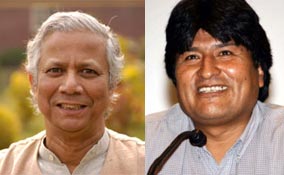
The phrase "making capitalism work for the poor" shows that capitalism, in its current form, has not worked for the poor. But Nobelaureate Muhammad Yunus and his Grameen Bank has proved that it can.
Bolivian President Evo Morales, on the other hand, is trying to prove that socialism can work for the rich too. The nationalization of Bolivia's gas and oil sector means that multinational companies are not getting as good a deal as they had before. Still, they signed the new contract, which proves that they're still making good enough profit out of it.
The caveat about Morales' nationalization program is that it can easily lead to inefficient bureaucracy and corruption as in the case of Indonesia's Pertamina. Therefore, efforts must be taken to make sure that socialism has its checks and balances, and still allow for some healthy competition.
Yunus used this principle with the Grameen Bank. He balanced capitalism by a strong motive to make it work for the poorest, i.e. by "tweaking" the system ('no collateral is fine'). His success is also due to efforts at strengthening comunity values of burden-sharing and collective achievement.
Can Morales "tweak" socialism in this style? If he can, do you think he'll get a Nobel Peace Prize in, say, 20 years from now?
Update:
See Amien Rais' take on Bolivia's oil & gas nationalization.
 technorati tags: political-economy
technorati tags: political-economy
No comments:
Post a Comment